Every winter, parents face the same exhausting cycle: a runny nose, a cough that won’t quit, sleepless nights, and the desperate urge to make their child feel better. So they reach for the bottle in the medicine cabinet-Children’s Robitussin, Dimetapp, or Mucinex-and give a dose, thinking it’s harmless. But here’s the hard truth: OTC cold medicine is not safe for young children, and giving it can do more harm than good.
Why OTC Cold Medicines Don’t Work for Kids
You might think these medicines help because they’ve been on shelves for decades. But the science says otherwise. The U.S. Food and Drug Administration (FDA) reviewed all available data in 2008 and found no proof that cough and cold medicines actually relieve symptoms in children under 12. Not one well-designed study showed they made kids feel better faster. Yet, the risks? Those are real-and well-documented. These products usually mix four types of drugs: antihistamines (like diphenhydramine), decongestants (like pseudoephedrine), cough suppressants (like dextromethorphan), and expectorants (like guaifenesin). For a child’s small body, that’s a lot of powerful chemicals. And since kids aren’t just small adults, their bodies process these drugs differently. That’s why a dose that seems right for a 3-year-old based on age can be way too high-or too low-when you look at their actual weight. Studies show age-based dosing leads to dosing errors in 23% to 37% of cases.The Real Danger: Overdose and Hospitalizations
The biggest problem isn’t that these medicines don’t work-it’s that they can send kids to the hospital. Between 2004 and 2015, over 1,500 children were treated in emergency rooms for bad reactions to OTC cold medicines. More than 65% of those cases involved kids under 2 years old. Symptoms? Fast heartbeat, extreme agitation, trouble breathing, seizures, even coma. Most of these incidents weren’t from intentional misuse. They happened because:- A parent gave two different medicines that both contained dextromethorphan
- A caregiver used a kitchen spoon instead of the dosing cup
- A child got into the medicine cabinet and took a few sips
What the Experts Say: Age Limits Are Clear
In 2008, major drug makers like Johnson & Johnson and GlaxoSmithKline agreed-voluntarily-to stop selling OTC cold medicines for children under 4. The FDA backed them up. Today, every bottle you buy says: "Do not use in children under 4 years of age." Some brands go further. Some say "under 6," others "under 12." That’s because the science gets even clearer as kids get older. The American Academy of Pediatrics (AAP) says there’s no reason to use these medicines at all for kids under 6. The American Academy of Family Physicians rates them a "D"-meaning the harm clearly outweighs any benefit. Even for older kids, the evidence is weak. One expert, Dr. Ian Paul, suggests dextromethorphan might help a bit with cough in kids 6 to 11. But he’s in the minority. The American College of Chest Physicians now recommends against all OTC cough medicines for children under 12. Their conclusion? The risk-benefit ratio is unfavorable.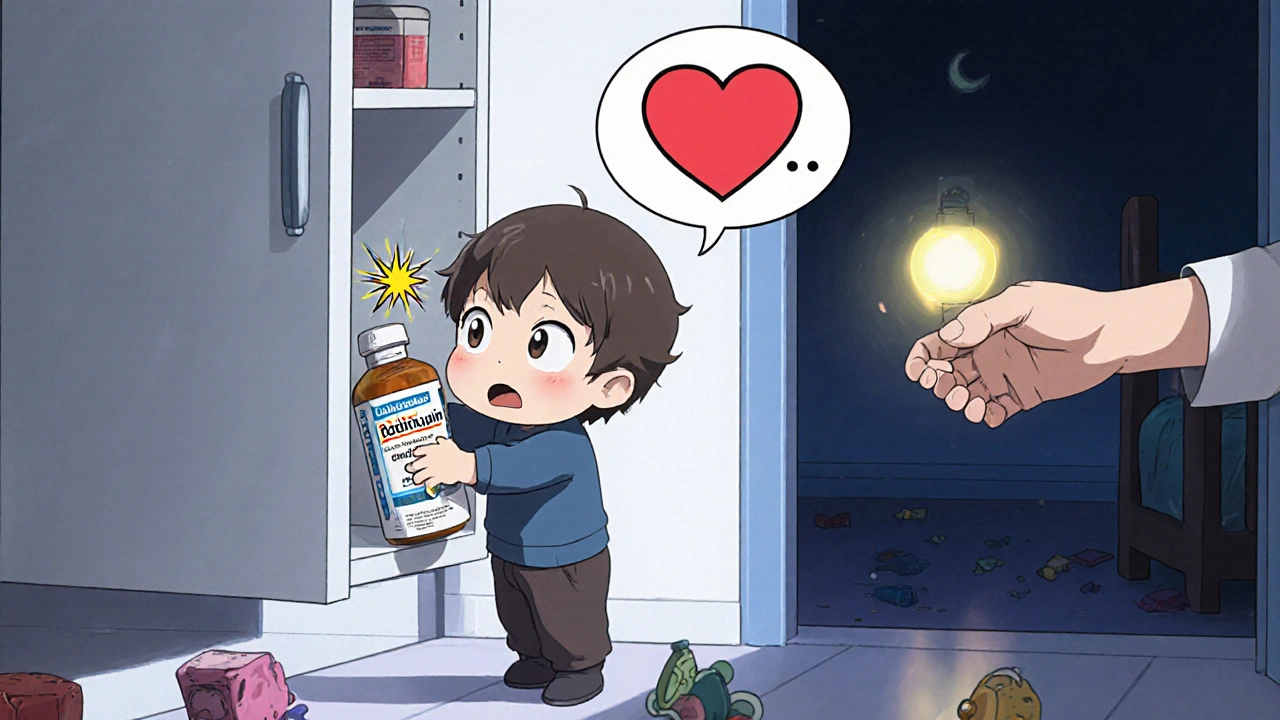
What Parents Are Doing-And Why It’s Dangerous
Despite all the warnings, a 2021 survey by the AAP found that 38% of parents still give OTC cold medicine to kids under 4. Why? Many say their doctor told them to. But when researchers checked medical records, only 17% had actually talked to a doctor. The rest were following old habits, advice from friends, or online forums. On parenting Reddit threads, you’ll see posts like: "My 2-year-old couldn’t sleep from coughing, so I gave him Children’s Robitussin DM-even though the label says not to." That’s not bravery. That’s desperation. And it’s exactly how accidents happen. One parent on Drugs.com wrote: "I gave it to my 3-year-old and she was hyper for 12 hours. I felt terrible." That’s not an outlier. It’s the norm.What Actually Works: Safe, Proven Alternatives
You don’t need medicine to help your child through a cold. Here’s what the AAP and CDC recommend instead:- Saline nasal drops: Put 2-3 drops in each nostril, then gently suction with a bulb syringe. Do this before meals and bedtime. It’s the #1 most effective way to clear congestion in babies.
- Honey: For kids over 1 year old, give 2.5 mL (half a teaspoon) of honey before bed. A 2018 Cochrane review showed it reduces cough frequency and severity better than placebo-and works as well as some OTC cough syrups.
- Hydration: Offer extra fluids. For a toddler, aim for about 50 mL per kg of body weight per day on top of their normal intake. Water, breast milk, or electrolyte solutions work best.
- Humidified air: Run a cool-mist humidifier in their room. Keep the humidity between 40% and 60%. Moist air soothes irritated airways.
- Fever relief: If your child is uncomfortable from fever, use acetaminophen (10-15 mg/kg every 4-6 hours) or ibuprofen (5-10 mg/kg every 6-8 hours) for kids over 6 months. Always dose by weight, not age.
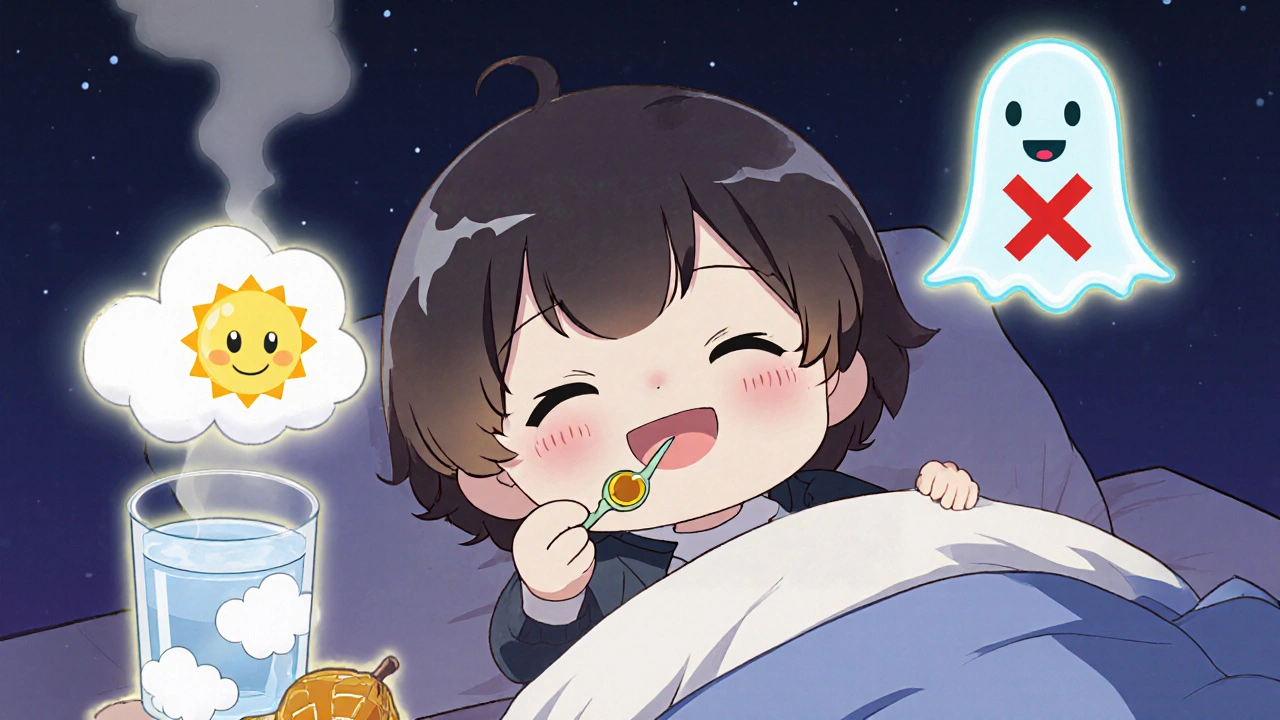
How to Use Medicines Safely-If You Must
If you decide to use a single-ingredient medicine for a child over 4 (and even then, proceed with caution), follow these rules:- Use only the dosing device that came with the bottle-never a kitchen spoon.
- Check the active ingredients. Avoid anything with more than one.
- Never use adult medicine for a child, even in a smaller dose.
- Store all medicines out of reach and in a locked cabinet.
- Call Poison Control (1-800-222-1222) immediately if you think your child took too much.
What’s Changing? The Future of Pediatric Cold Care
The market is shifting. Between 2010 and 2015, 37 pediatric cold medicine brands were pulled from shelves because they couldn’t prove they worked. Sales have dropped from $1.2 billion in 2007 to $840 million in 2022. Companies are now focusing on adult products and natural alternatives. The FDA is pushing for new rules. By 2025, they may require all OTC pediatric medicines to go through clinical trials. Some experts are calling for dosing cups with flow restrictors that limit each dose to 5 mL-something that could reduce overdose risk by 82%. Meanwhile, the European Union banned OTC cold medicines for kids under 6 in 2009. Switzerland banned dextromethorphan entirely for children in 2022. The U.S. is catching up.Bottom Line: Less Medicine, More Care
A cold isn’t dangerous for most kids. It’s uncomfortable. It’s tiring. It’s messy. But it’s not a medical emergency. And giving your child a medicine that doesn’t work-and could hurt them-isn’t care. It’s risk. The best thing you can do is comfort your child. Offer fluids. Clear their nose. Let them rest. Use honey if they’re over 1. Keep the air moist. And when in doubt-call your pediatrician. You don’t need a bottle to prove you love them. You just need to be there.Can I give my 3-year-old Children’s Tylenol Cold?
No. Children’s Tylenol Cold and similar multi-symptom products are not safe for children under 4. These products contain multiple active ingredients like dextromethorphan and pseudoephedrine, which have no proven benefit for young children but carry serious risks including seizures, rapid heart rate, and coma. Even if the label says "for ages 2-3," the FDA and AAP strongly advise against using any OTC cold medicine in children under 4.
Is honey safe for toddlers with cough?
Yes, honey is safe and effective for children over 1 year old. A half-teaspoon (2.5 mL) before bedtime can reduce cough frequency and help your child sleep better. A 2018 Cochrane review found honey worked better than placebo and as well as some OTC cough syrups. Never give honey to babies under 1 year due to the risk of infant botulism.
Why do some labels say "under 6" instead of "under 4"?
Some manufacturers have chosen to extend the age restriction beyond the FDA’s minimum recommendation of under 4. This is often done out of extra caution or to align with guidelines from organizations like the American College of Chest Physicians, which advises against all OTC cough medicines for children under 12. Always follow the strictest label instruction.
What should I do if my child accidentally takes too much cold medicine?
Call Poison Control immediately at 1-800-222-1222. Do not wait for symptoms to appear. Even small amounts can be dangerous. Keep the medicine bottle handy when you call so you can tell them exactly what was taken and how much. If your child is having trouble breathing, turning blue, or is unresponsive, call 911.
Are natural or herbal cold remedies safe for kids?
Many herbal or "natural" cold remedies aren’t regulated like medicines, so their safety and dosing aren’t proven. Products like echinacea, elderberry, or essential oils can cause allergic reactions or toxicity in children. Stick to evidence-based options like saline drops, honey (for kids over 1), hydration, and humidifiers. If you’re considering anything herbal, talk to your pediatrician first.
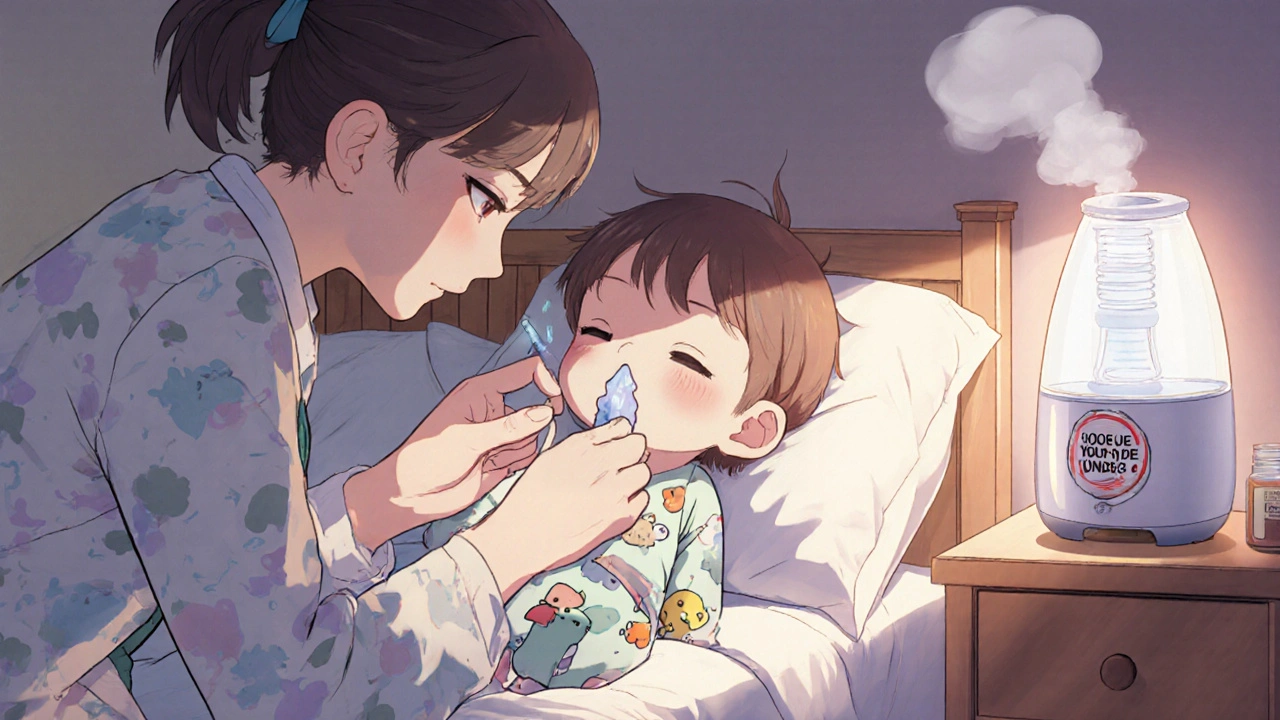
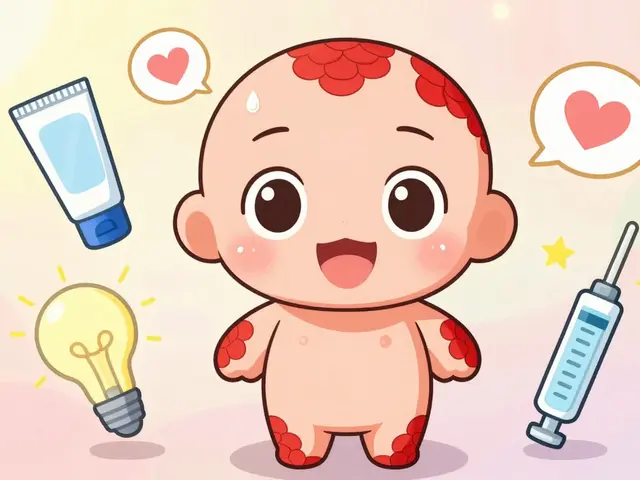
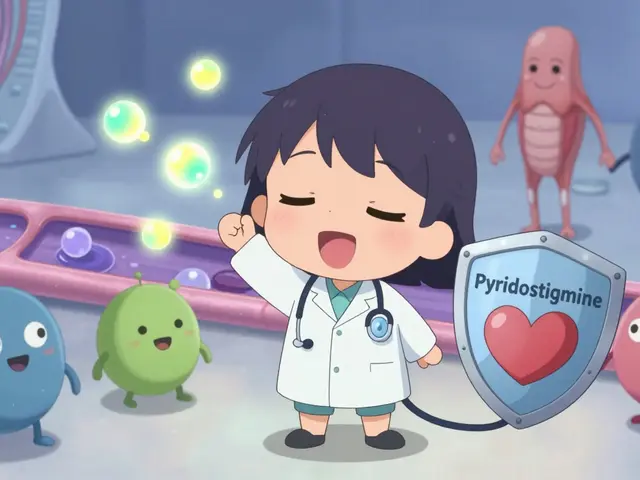
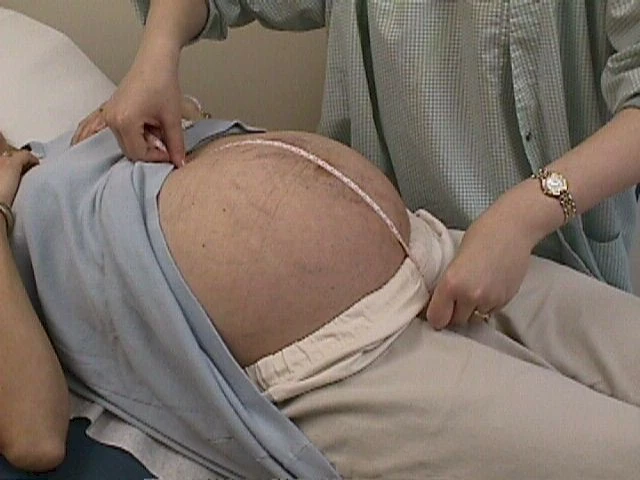
I gave my 2-year-old Robitussin last winter because she couldn’t sleep-yeah, I know, I’m an idiot. She was bouncing off the walls for 12 hours. I thought it was just ‘energy.’ Turns out it was dextromethorphan poisoning. We ended up in the ER. Don’t be like me. Just use honey. It’s cheaper, safer, and doesn’t turn your kid into a human jackhammer.
As a dad from India, I never used those medicines. We use saline drops, steam from hot water, and honey-simple things. My son had a cold for 7 days, no medicine, and he was fine. The body knows how to heal. We just need to help it, not fight it with chemicals.
There’s a significant disconnect between clinical guidelines and parental behavior here. The FDA’s 2008 advisory, coupled with AAP’s D-rating, should be non-negotiable-but the persistence of off-label use suggests a failure in health literacy dissemination, not just parental negligence. The multi-ingredient product issue is particularly egregious from a pharmacokinetic standpoint in developing hepatic systems.
STOP BEING LAZY PARENTS. 🤦♂️ You think giving your kid a cough syrup makes you a good parent? No. It makes you a walking liability. You’re not ‘helping’-you’re gambling with their brainstem. If you can’t read a label, maybe don’t have kids. And yes, I’m talking to YOU, Chris Ashley. You’re lucky your kid didn’t die. 😤
Oh my GOD, I just read this and I’m shaking. My cousin gave her 3-year-old Mucinex DM because ‘it’s just a little bit’-and she had a seizure. Like, in the middle of the living room. We thought it was a dream. She’s fine now, but I swear, every time I see a kids’ cold bottle, I feel like screaming. Why do people still do this?!?!?!
I used to be the one giving the syrup. Then I read the AAP guidelines and switched to honey and saline. My daughter slept through the night for the first time in weeks. No drama. No panic. Just quiet. It’s not magic-it’s just smarter. You don’t need a pharmacy to love your kid.
It is, indeed, a matter of profound societal regression that pharmacological quackery continues to be normalized within the domestic sphere, despite the unequivocal consensus of international pediatric authorities. The commodification of parental anxiety into pseudo-scientific elixirs represents not merely a failure of regulation, but a collapse of epistemic responsibility. One is left to wonder: when did ‘trust your gut’ become a substitute for evidence-based medicine?
My kid got a cold last week. I used saline drops before every meal and a humidifier at night. He was up once, not three times. No meds. No drama. Just a tired but happy toddler. Seriously, people-this isn’t hard. 🤗
Let me be clear: the FDA’s stance is not merely a recommendation-it is a directive grounded in empirical evidence. The fact that 38% of parents still administer these agents to children under four is not just alarming-it is indefensible. And the misuse of kitchen spoons? That’s not negligence; that’s criminal recklessness. I implore you: read the label. Use the dosing cup. Call Poison Control. Your child’s life is not a guessing game.
Let’s be honest: most of these parents don’t care about the science. They just want to feel like they’re doing something. That’s why honey works as a placebo-it gives them the illusion of control. But the real problem isn’t the medicine. It’s the refusal to accept that sometimes, the best thing you can do is nothing at all.